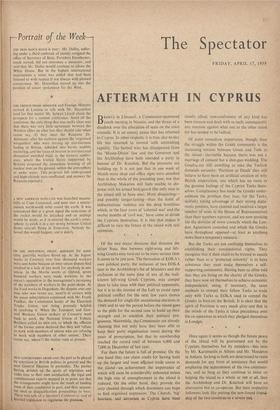AFTERMATH IN CYPRUS
BRAWLS in Limassol, a Communist-sponsored youth meeting in Nicosia, and the threat of a deadlock over the allocation of seats on the town councils. It is an uneasy peace that has returned to Cyprus. In other respects, it is true, day-to-day life has returned to normal with astonishing rapidity. The barbed wire has disappeared from the 'Mason-Dixon' line and the Governor and the Archbishop have both attended a party in honour of Dr. Kutchuk. But the pressures are building up. It is not just that in one week of March more shop and office signs were smashed than in the whole of the preceding year, nor that Archbishop Makarios still feels unable to dis- pense with his armed bodyguard (the only man in the island still to have one). More disquieting— and possibly longer-lasting----than the habit of indiscriminate violence are the deep hostilities which, in the four years of 'colonial war' and the twelve months of 'civil war,' have come to divide the Cypriots themselves. It is this that makes it difficult to view the future of the island with real optimism.
Of the two major divisions that threaten the infant State, that between right-wing and left- wing Greeks May turn out to be more serious than it seems to be just now. The formation of EOKA's own political party, the inclusion of two EOKA men in the Archbishop's list of Ministers and the exclusion at the same time of any of the well- known left-wing Greek Cypriots, may compel them to take issue with their political Opponents, but it is to the interest of the Left to avoid open political conflict for the next few years (hence the demand for single-list uncontested elections in • 1960) and to use the period before the island goes to the polls for the second time to build up their strength and to establish their political pro- gramme. Meanwhile, the Communists are already claiming that not only have they been able to keep their party organisation intact during the years of proscription, but that its membership reached the record total of between 6,000 and 7,000 in December of last year.
For them the future is full of promise. On the one hand they can claim credit for having built up the largest and most efficient trade union in the island—an achievement the importance of which will soon be considerably enhanced unless the high rate of unemployment in the island is reduced, On the other hand, they provide the only channel through which discontent can hope to find organised expression:The Church, 'big' business, and terrorism in Cyprus have been closely allied; non-conformity of any kind has been treason and dealt with as such; consequently any reaction against what one or the other stood for has tended to be-radical.
Of more immediate importance, though, than the struggle within the Greek community is the increasing tension between Greek and Turk in the island—inevitable because theirs was not a marriage of consent but a shot-gun wedding. The Greeks. are still unwilling to take the Turkish demands seriously; 'Partition or Death' they still believe to have been an artificial creation of wily British imperialism, one which has no roots in the genuine feelings of the Cypriot Turks them- selves. Complacency has made the Greeks under- estimate the problem they face; for the Turks, skilfully taking advantage of their strong diplo- matic position, have claimed and received a larger number of seats in the House of Representatives than their numbers warrant, and are now pressing for the division of town councils which the Lon- don Agreement conceded and which the Greeks have throughout opposed—at least as anything more than a temporary measure.
But the Turks are not confining themselves to establishing their constitutional rights. They recognise that if their clahn.to be treated as equals rather than as a 'protected minority' is to have substance they must make themselves a self- supporting community. Having been so often told that they are living on the charity of the Greeks, they have now set themselves to achieve economic independence, using, if necessary, the same methods to compel their fellow Turks to trade only with Turks as EOKA used to compel the Greeks to boycott the British. It is clear that the spirit of Partition is very much alive and that in the minds of the Turks it takes precedence over the co-operation to which they pledged themselves in London.
Once again it seems as though the future peace of the island will be guaranteed not by the Cypriots themselves but by outsiders—this time by Mr. Karamanlis in Athens and Mr. Menderes in Ankara. So long as both are determined to resist demands for any form of assistance that would emphasise the separateness of the two communi- ties, and so long as they continue to insist on helping the island as a whole or not at all, then the Archbishop and Dr. Kutchuk will have no alternative but to co-operate. But their respective followers look like putting the new-found friend- ship of the two countries to a severe test.


































 Previous page
Previous page